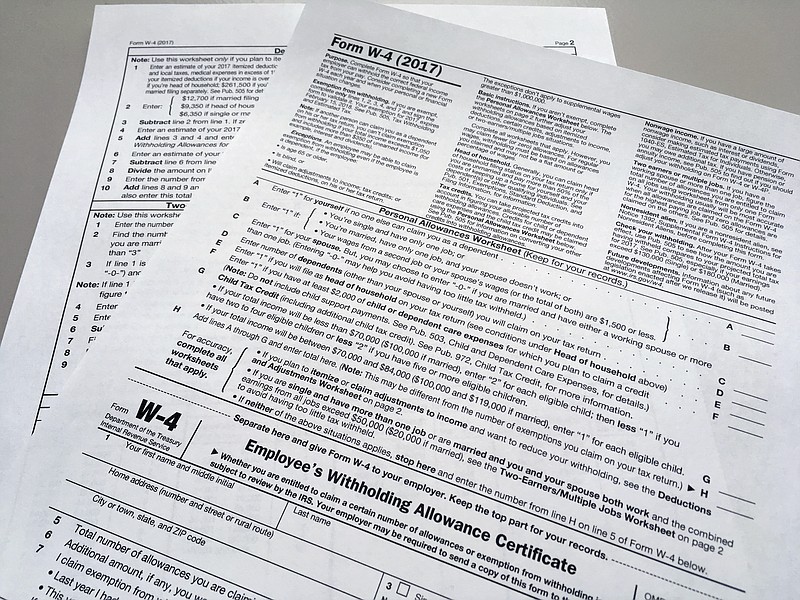Missouri House Minority Leader Crystal Quade, D-Springfield, said Wednesday she knows of one state employee who received more than $7,300 in income tax refunds last year from the state and federal governments - and this year will owe almost $4,600, with no major change in income or circumstances.
During the inaugural meeting of the new House Special Committee on Government Oversight, Quade asked Revenue Director Joel Walters why his department isn't doing a better job of warning Missourians they also might be facing a similar surprise, after the federal government's tax cut law went into effect just more than a year ago.
However, Walters and Mark Siettmann, Revenue's legislative liaison, told the committee the department doesn't know who's going to be affected until the tax returns are submitted, because the state doesn't see each taxpayer's W-4 form that authorizes the employer to withhold taxes from each paycheck.
The federal tax law changes impact that amount, even if the employee makes no changes to the withholding instructions on the W-4, Walters said.
And, Siettmann added, most people don't change their W-4 forms.
Walters said the problems of too-little withholdings came to light last summer, after Congress passed and President Donald Trump signed the "Tax Cuts and Jobs Act, which was the biggest change in federal tax legislation in 30 years."
The federal Internal Revenue Service adjusted its tax withholding tables in February 2018, and Missouri's Revenue Department changed the state withholding tables in March 2018.
"At that time, we knew there were fundamental changes, and that this would impact the taxation, overall, of individuals within Missouri," Walters explained, noting state income tax revenues began falling because of the federal tax deductions, while sales taxes and corporate income taxes "were up."
He said reviews and calculations showed no errors in the tax tables, but the state eventually determined the tables had not been adjusted for the federal standard deduction - since at least 2004.
"That's what's become known as the 'Error in the Tables,'" Walters explained, adding that, "for a person making about $30,000 a year would have impacted (tax) withholding by about $3 per paycheck."
For an employee paid 24 times a year, that would be a $72 difference in the amount that should have been withheld.
"The overall impact of that is resulting in an under-withholding, as compared to what people were expecting," Walters told the committee. "In some ways, you could argue, it's a more accurate withholding, because it's going to be closer to the level of the amount of tax that they owe."
And ultimately, he said, changes don't "impact the amount of tax anybody owes."
However, he acknowledged, it could mean a big difference in the size of a refund, or a tax bill, because the amount withheld wasn't what the taxpayer expected.
Several committee members noted many taxpayers use the withholding system to make sure they have a refund at tax-time.
Walters and Siettmann said the adjustments caused by the federal tax law changes mean those on-purpose savings likely won't be possible in future years, but the "surprise" some taxpayers are complaining about will be a this-year-only thing.
"People (won't be) getting big refunds anymore," Siettmann said.
Committee Chairman Robert Ross, R-Yukon, noted he and other lawmakers are "receiving calls from constituents who are frustrated and don't understand."
And, even though some may understand they ultimately are paying less in taxes, Ross added, "The only thing they're going to know or remember is the fact that they had to get that checkbook out - and they're going to be furious!"
Walters said his department stands ready to work with individuals about resolving their issues this year.
"This is not something that is new to us," he explained. "We do this on a day-to-day basis."
Missourians aren't alone.
"At the federal level, the same thing is occurring, from the exact same issues," he said. "In fact, if you look at other states that follow federal law, they're seeing the exact same thing."
House Speaker Elijah Haahr, R-Springfield, created the special House panel last week to review and monitor policy implementation by the state's executive branch and its departments.
As they begin working on their income tax forms, Missourians - and people across the country - are discovering they may not get the refunds they had anticipated.
Although the committee is starting with the Revenue issue, Ross said: "We're going to do some important work in this committee, and throughout the session, from time to time as issues arise."

